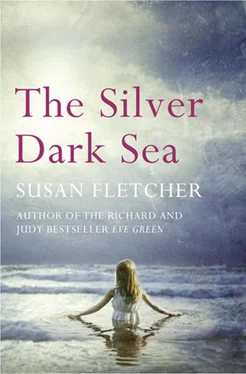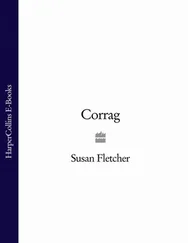She settles next to the wrought-iron bed.
Her own life changed nearly four years ago. Everyone’s life changed three years, ten months, three weeks and four days ago, and we do not speak of it – we never speak of what we lost . As if the loss would be greater if it was named and talked over. But it could not be greater.
He sleeps. This man who looks like Tom but is not Tom. She knows that he is someone else.
Tabitha stays with him all night. Sometimes he whispers; sometimes his lips move soundlessly and his hands seem to take hold of the air. He is handsome – incredibly so. He is a gift. His face … She cannot stop looking at this person lying here.
She is a sensible woman. Tabitha is the woman of swabs and antiseptic washes. She has seen sights that no-one on this island has seen or ever will and she likes to think she can keep her feelings packed away – popped on ice, perhaps. She has secrets that no-one knows of, certainly. But this is different. This man is not like anyone else who has lain on this bed, and it is late, and the sea is loud, and her feelings are not packed away or kept on ice tonight.
Please , she whispers. She does not often pray.
Let this be the start of … Of what? What is she wanting? What does she hope for, as she’s sitting here? The only words that she can find are something special. Something lovely. New, and lovely, and good.
There are moments that come to matter in our lives – defining, powerful moments. Sometimes they happen so quietly that they slip by unmarked so that only later do we look back and realise that they changed everything; sometimes, they are known for exactly what they are. Tabitha knows that this matters. Tonight is a night she will not forget. It is a curious, extraordinary beginning. This will not happen twice – not in her lifetime. And it is the start of something that she knows – as a nurse knows, instinctively – will change them all. She isn’t sure how, but it will.
Let him stay , she whispers this. He is better than a bottle top, or a lone boot. He is better than any broken shell could be.
And the man stirs at the moment. He takes hold of the blanket, turns onto his back. Sea … he says, as if missing it.
Sea … as if that is where he longs to be.
Many years ago, there was a man with a bristled moustache who said mark the air … He’d wander the fields, calling it; he’d take hold of wrists, at the harbour. In his last years of life, it was all he ever said. Mark the air, do you hear me?
He was one of the Tans. There are stories of the Tans that I do not love too much – a taste for whale blubber and for marrying too close. It was the Tans who’d see a distant ship and wish for it to founder – so they’d swing false lights at night, to lure it onto rocks. They knew (it was said) how to break knuckles with one swift blow, or how to grip a man’s gold tooth and pull. Those were the Tans or most of them. Or so the stories go.
Lucas Tan was the last of his line. He’d lost his only son at sea. And it had not been the sea’s fault, for the waves had been calm enough that day; a strong north wind had caught the boy, blown him overboard. That north wind … Afterwards, Lucas swore. He stayed away from church. He eyed the clouds, clutched the bottle by its neck and said mark the air … You listen to me . And those are the words he’s remembered for – those, and those only. Slurred, pained, whisky-warm.
Was he right? Perhaps. For there are many winds. And there are so many stories of wind on Parla that if you ask to hear them, if you were to go to Abigail Coyle and say what do you know about the different winds? a new wind would appear, as she answered. A fast, unending rush of air would come from between her gums: the different winds? Oh! So many … Where do I start? The wind that brings in fitful sleep? The first gale of the autumn? With the east wind, her husband swears that he can smell the mainland – heat, diesel, milk, spices, perfume, human breath.
But it’s the north wind that she’ll speak of, above all other winds.
The changing wind , Abigail told me. It never blows without changing the island in some way … For better, or worse? Who knows. It can do either, and that’s the truth. For the north wind has both mended hearts and broken them. It has brought both beauty and misfortune, restlessness and sleep. It has carried in babies but it has also taken lives and so the islanders worry when they hear the north wind blowing. They fear death – actual, physical, permanent death, but also the non-literal, where the heart has kept beating but its wish to keep doing so is small, very small if there at all.
* * *
It is past midnight.
In the house called Wind Rising, Leah is awake. She lies in bed and looks at the ceiling she has known all her life. The same paint on the same walls.
Leah is thinking of men. She thinks of Sam Lovegrove who ran into their kitchen five hours ago, saying Ian? Ian? She’d heard him. She’d put down her book, padded out onto the landing and looked down through the banisters. Ian? Listen – a man’s come ashore … She’d seen his blond head.
Then they had left, gone outside. And Leah had stayed on the landing. She’d listened to the sounds of a house quietening – the fading of footsteps, the slop inside the kettle, having been poured.
And she’d heard a tut-tut . A pause; then a rapid tut-tut-tut-tut-tut.
Leah had known what it was. She’d turned, walked into the bathroom where the sound was louder, looked up. Tut. The air vent – white, with the strands of cobwebs on it. It only ever rattles when the north wind blows.
A man’s come ashore …
Leah sits up now. She kneels by the window, pushes the window up so that air pours in like water. Her hair stirs; her nightdress does.
I could be nowhere else . This is a Parlan night. It is a night in her Parlan bedroom – with the pink walls of her childhood and the known, old sound of a book’s pages being turned by the breeze, one by one. It is a night like a thousand other Parlan nights in which she has listened to the sea’s constant sound – not a breathing back and forth as might be imagined but a low roar that does not change pitch or volume. Tonight could be like all the other nights.
But it isn’t quite.
She’d loved that tut-tut-tut . She’d smiled at it, in the bathroom – and she is smiling now. A change … How Leah has longed for a change. For years, she has watched the same sights, on Parla – how the lighthouse turns, how sheep kneel to graze, how the Star ’s gangplank drops onto the quayside at the precise time it’s meant to. The mainland’s shape does not alter; the rising damp in the downstairs loo does not fade. And for years she has heard the same conversations – about ferries, wool, if the hens are laying, if Milton has fresh milk in stock, whether she’s had breakfast yet, so that Leah has rolled her eyes, thought it is always the same, always the same. Why is it always the same? Or at least, she used to think it. In time, the island made her heavier. It made her lie in her bedroom and think of nothing – nothing at all.
This slow, salty sameness – day in, day out.
But now? Tut-tut. And a man has come. The sea and the north wind left a man at Sye for Sam, of all people, to find. And as Leah had stood on the landing and looked down onto his red-blond hair she’d felt … what? Hope. That’s what. She’d barely recognised it. She has not been hopeful – for what good could it ever have done? How might hope have helped her? And so to have it now, in a dark bedroom, feels tender and lovely and absurd. It is a green shoot amongst the snow.
Читать дальше












